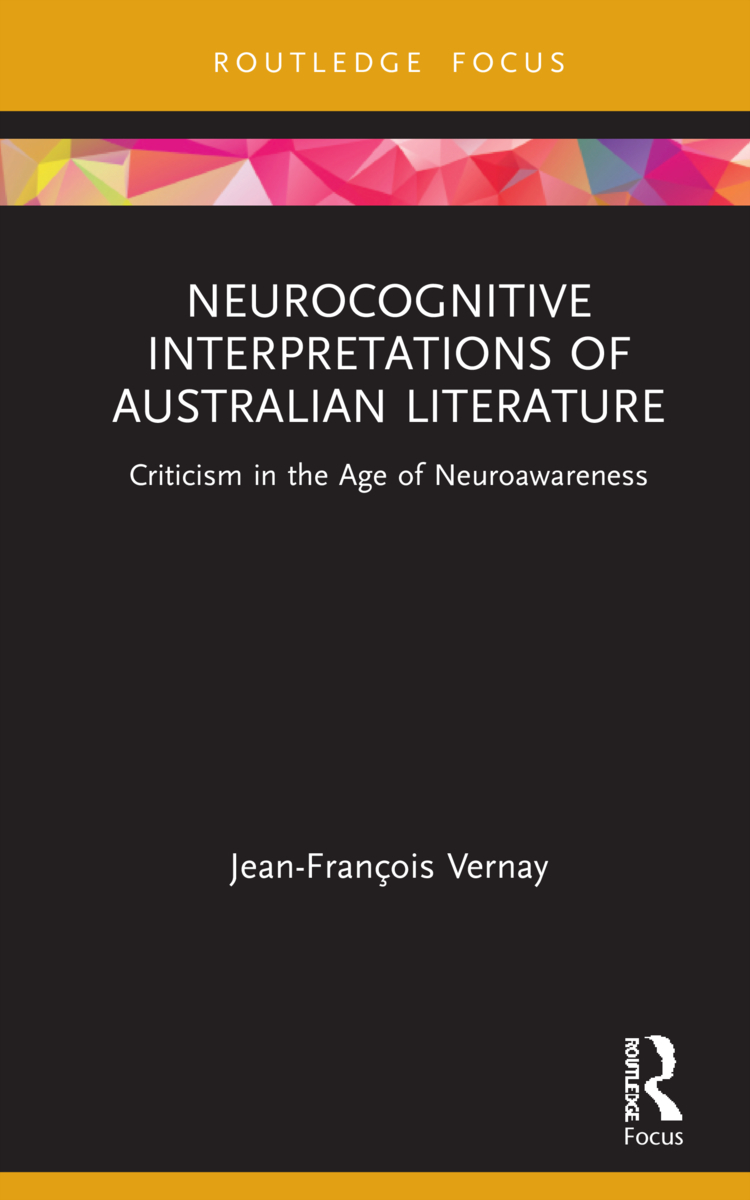
J.-F. Vernay, Neurocognitive Interpretations of Australian Literature Criticism in the Age of Neuroawareness
Jean-François Vernay,
Neurocognitive Interpretations of Australian Literature Criticism in the Age of Neuroawareness,
Routledge, collection "Focus", 2021.
EAN13 : 9780367751982.
This unique book on neurocognitive interpretations of Australian literature covers a wide range of analyses by discussing Australian Literary Studies, Aboriginal literary texts, women writers, ethnic writing, bestsellers, neurodivergence fiction, emerging as well as high profile writers, literary hoaxes and controversies, book culture, LGBTIQA+ authors, to name a few. It eclectically brings together a wide gamut of cognitive concepts and literary genres at the intersection of Australian literary studies and cognitive literary studies in the first single-author volume of its kind. It takes Australian Literary Studies into the age of neuroawareness and provides new pathways in contemporary criticism.
*
Table of Contents
Foreword by Tony Hughes-d’Aeth
INTRODUCTION: GOING THE EXTRA SCHOLARLY MILE
PART I: COGNITION AND LITERARY CULTURE
1 Up for a Cha(lle)nge? A Case for Cognitive Australian Literary Studies
2 Do Judge a Book by Its Cover! Attraction and Attachment in Markus Zusak’s The Book Thief
PART II: COGNITION AND THE MIND
3 Gazing Inward and Outward: (Trans)Formation in C.J.Koch’s Bildungsroman Protagonist and Readers
4 Australian High-Functioning ASD Fiction in the Age of Neurodiversity: Graeme Simsion’s Rosie Trilogy
PART III: COGNITION AND THE BODY
5 The Erotics of Writing and Reading Australian Novels: Linda Jaivin, Frank Moorhouse and John Purcell’s Art of Dealing with Dirt
6 Brains in Pain and Coping Bodies: Trauma, Scars, Wounds, and the Mind-Body Relationship in Western Australia Aboriginal Literature
PART IV: COGNITION AND EMOTIONS
7 Angry Gay Men: Rage, Race and Reward in Contemporary Australian Advocacy Fiction
8 No Time for Outrage? The Demidenko Affair: Literary Representations, Criticism and Moral Emotions in The Hand That Signed the Paper
Voir le livre sur le site de l'éditeur…
*
Reviews:
"Jean-François Vernay makes the case in this book for a turn to cognitive Australian literary studies, both in Australian novels themselves and in the emergence of a "synergistic field of cognitive-inspired Australian literary scholarship". These are new, provocative ideas which offer unexpected ways of reading a wide range of Australian fiction from Markus Zusak to Frank Moorhouse, from Claire Coleman to Christos Tsiolkas, from Linda Jaivin to Helen Demidenko. The analyses are fully alert to the scopic and haptic pleasures books can provide, the effects of the "neurodiversity paradigm", the cognitive mechanisms generated by erotic themes, the interaction between mind and body in Indigenous fiction, the representation of rage in the works of "angry gay" writers, and the major public controversy caused by Demidenko’s novel."
David Carter, Emeritus Professor, FAHA, The University of Queensland, Australia.
"The understanding of what we humans get up to with each other, as members of our species and our cultures, has been the principal aspiration of both cognitive psychology and literary studies. Until very recently, however, these two disciplines have stayed rather far apart. In this timely monograph, Jean-François Vernay describes how they are at last approaching each other in mutually beneficial ways. This book shows how fiction and imagination are together coming into the centre of the neurocognitive enterprise."
Keith Oatley, Author of Our Minds, Our Selves: A Brief History of Psychology.